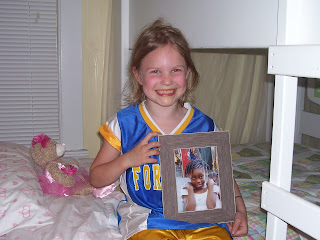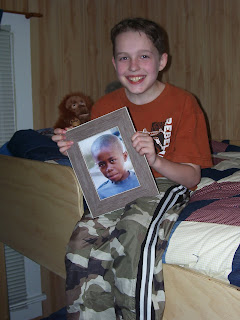 It had been my intention to share with friends and family the tidbits Chad and I have learned about parenting adoptive children so that everyone feels in the loop. Those were my plans for after my end-of-December Haiti trip -- my first task for January -- but you know what transpired instead. So, as we await the next phase of our journey, we attempt to balance the superstition of not getting the cart before the horse with the need to be prepared for the sake of the children. Here, I shall offer my meager best so that when new Cluver kids come home, we are all positioned to make the transition as well as is possible. The daily job of supporting the kids will be challenging, no doubt, but as I tell my students ad nauseum -- knowledge IS power . . . Let's see, where to begin? Well, at the start, I suppose . . .
It had been my intention to share with friends and family the tidbits Chad and I have learned about parenting adoptive children so that everyone feels in the loop. Those were my plans for after my end-of-December Haiti trip -- my first task for January -- but you know what transpired instead. So, as we await the next phase of our journey, we attempt to balance the superstition of not getting the cart before the horse with the need to be prepared for the sake of the children. Here, I shall offer my meager best so that when new Cluver kids come home, we are all positioned to make the transition as well as is possible. The daily job of supporting the kids will be challenging, no doubt, but as I tell my students ad nauseum -- knowledge IS power . . . Let's see, where to begin? Well, at the start, I suppose . . . The first three months comprise, typically, the cocoon phase, much like when a newborn comes home, except that adopted children usually have had previous life experiences that taught them to fend for themselves and not to trust the permanency of parents. So, not only do the kids need a "sensory bath" of their parents and siblings -- what Mom and Dad's faces look like, how they smell, what they sound like -- until the familiarity intertwines with their own being, but due to a long history of transient adults (aunts, nannies, missionaries, etc), it is also critical that intimate touch from/with the kids (hugging, lap-sitting, cheek-kissing) be shared only with their new parents. Unfortunately, widespread affection with many people could inhibit the all-important child-parent attachment for these kids -- it would reinforce indiscriminate(empty) affection. The child-parent bond is primal and primary if healthy relationships are to follow with extended family, later with peers, and eventually, with their future spouses and their own children.
 The next three months (3-6 mo.) is reportedly frustrating because at this point the human adults (parents included) are prone to feel (note: FEEL, psychologically) that things should be "normal," but there is yet much learning to accomplish. Imagine becoming aware of the way a different family does things, a new set of norms for a given community, and then amplify it by factors like crossing international borders, changing social class, and the on-going work to trust and refine the behaviors of permanent, healthy family life. It's culture shock and family shock all at once. There will be times when behaviors might be observed and interpreted one way (jockeying assertively for the last cupcake, appearing to be greedy), when it may be due to a different causative factor altogether (having been accustomed to competing with 50 other kids for food at the orphanage). There will be times when we will have to do things differently than we have done before so that we can parent all of the children appropriately and effectively; please feel comfortable asking us questions and talking with us out of earshot of the kids, and PLEASE know not to take anything personally (like the possibility that we may sometimes have to turn down invitations or cut visits short, as examples.)
The next three months (3-6 mo.) is reportedly frustrating because at this point the human adults (parents included) are prone to feel (note: FEEL, psychologically) that things should be "normal," but there is yet much learning to accomplish. Imagine becoming aware of the way a different family does things, a new set of norms for a given community, and then amplify it by factors like crossing international borders, changing social class, and the on-going work to trust and refine the behaviors of permanent, healthy family life. It's culture shock and family shock all at once. There will be times when behaviors might be observed and interpreted one way (jockeying assertively for the last cupcake, appearing to be greedy), when it may be due to a different causative factor altogether (having been accustomed to competing with 50 other kids for food at the orphanage). There will be times when we will have to do things differently than we have done before so that we can parent all of the children appropriately and effectively; please feel comfortable asking us questions and talking with us out of earshot of the kids, and PLEASE know not to take anything personally (like the possibility that we may sometimes have to turn down invitations or cut visits short, as examples.)As for after the initial 6 months of adjustments -- a new "normal" usually begins to take shape, and lifelong processing continues, revisiting earlier childhood hurts with new levels of sophistication . . . birthdays may be difficult rather than a time of frivolity, a graduation may be a reminder of those back home without access to education, the birth of his/her own child will likely recall deep feelings about his/her own birth parents . . .
Attempting to relay all the details we've encountered in our training would surely bore away whatever few readers see this blog; so, I shall refrain. And to pretend that some seminars and a short stack of books have taught us all we need to know would be foolhardy to say the least. Thus, I'll leave it at what we've got above, hoping that I've given you a general feel for things and have provided an open door for you to talk with us privately about anything you wonder.
Now, if we can just get them home.
(A special thanks to Dr. Karyn Purvis' webinar and the insights of friend Jill Lear.)
(A special thanks to Dr. Karyn Purvis' webinar and the insights of friend Jill Lear.)
No comments:
Post a Comment
Civil dialogue with signed comments welcome!